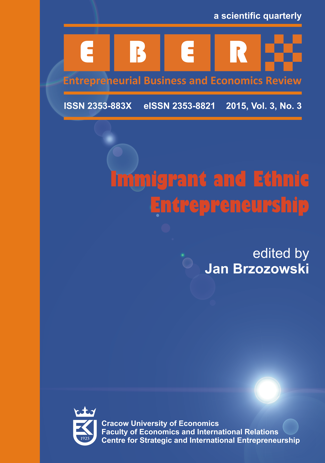Network Benefits for Ghanaian Diaspora and Returnee Entrepreneurs
Network Benefits for Ghanaian Diaspora and Returnee Entrepreneurs
Author(s): Sharon Doreen Mayer, Aki Harima, Jörg FreilingSubject(s): Business Economy / Management, International relations/trade, Developing nations, Migration Studies
Published by: Uniwersytet Ekonomiczny w Krakowie
Keywords: diaspora entrepreneurship; returnee entrepreneurship; entrepre-neurial network; network benefits
Summary/Abstract: Objective: The objective of this paper is to investigate how diaspora and returnee entrepreneurs use networks in the country of origin (COO) and country of residence (COR) and which benefits they gain from such networks. Research Design & Methods: In the face of the early state of research and the complexity of the subject, exploratory case study research was chosen. One case was conducted with a Ghanaian diaspora entrepreneur in Germany and the other with a Ghanaian returnee entrepreneur back from Germany. Face-to-face semi-structured interviews with both of the entrepreneurs were conducted to identify their network dynamics. Findings: Ghanaian diaspora entrepreneurs benefit mainly from networks in the COR and Ghanaian returnee entrepreneurs from networks in the COO. These findings are not fully consistent with the assumption of previous scholars that diaspora and returnee entrepreneurs intensively use both COO and COR networks. Implications & Recommendations: The network usage of diaspora and returnee entrepreneurs varies to a large extent depending on industry, personal background and human capital. It is necessary to research more intensively the heterogeneity within diaspora entrepreneurship. Contribution & Value Added: This paper contributes to the development of understanding of heterogeneity in diaspora and returnee entrepreneurship. The cases present that the degree and balance of mixed embeddedness of returnee and diaspora entrepreneurs in COO and COR may differ to a large extent and they influence how they benefit from different type of networks in both countries. This difference may arise from the physical absence/presence of entrepreneurs in the country or the structure of their business. We identified several dimensions to be considered in future research.
Journal: Entrepreneurial Business and Economics Review
- Issue Year: 3/2015
- Issue No: 3
- Page Range: 95-121
- Page Count: 27
- Language: English

